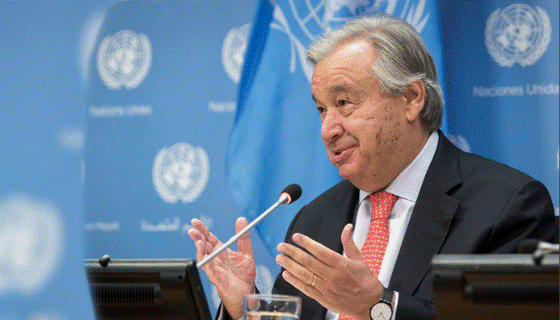UN Secretary-General, António Guterres, on Thursday, urged the Security Council to strengthen peace operations in Africa, noting that the gains made on the continent and elsewhere were reversing.
Guterres, who made the appeal while briefing the Security Council at the UN headquarters in New York, emphasised the need for “a sharper focus on (prevention) and building resilience.”
According to him, the exploitation of natural resources, or competition to exploit them, can trigger violent conflict.
“Within the Our Common Agenda report, the proposed New Agenda for Peace prioritises prevention and peace building investments.
“Our peace operations must be empowered and equipped to play a greater role in sustaining peace at all stages of conflict, and in all its dimensions,”
he said.
The UN chief, however, outlined four priorities, beginning with better local community engagements and promoting more responsive and inclusive governments and institutions.
He stated that peace operations contributed to shared goals for legitimate, responsive, and inclusive governance; created space for dialogue and political participation and reduced communal violence.
“It also contributes to the delivery of basic services, encourages reconciliation; and promotes equal access to justice.
“But quicker and more effective actions are required to address needs and grievances by “strengthening a whole-of-society approach and increase investments that build trust, community engagement and cohesion,”
he said.
The UN chief also reminded the Security Council that peacekeeping played a “critical role” in supporting UN operations in building resilience and sustaining peace.
“By acting early, engaging strategically, and speaking with one voice, this Council can mobilise the international community’s political and financial support and foster the commitment of conflict actors to secure peace,” he said.
Guterres pointed out that rising geopolitical tensions, spreading insecurity, and other powerful instability drivers were mutually reinforcing, citing escalating climate catastrophe, worsening hunger and poverty, and deepening inequalities.
“All of this is fuelling political tensions, economic despair and social unrest,”
he said.
At the same time, unconstitutional changes of government are proliferating alongside conflicts between nations, invasions, and wars, as entrenched divides between world powers continue to limit a collective response.
Meanwhile, the secretary general said the gap between humanitarian needs and humanitarian assistance kept widening.
“Human rights and the rule of law are under assault, while cyber warfare and lethal autonomous weapons present risks we barely comprehend and lack the global architecture to contain,” he said.
UN Assistant Secretary-General for Africa, Martha Ama Akyaa Pobee, highlighted the complementary work of peacekeepers, human rights and humanitarian officials, along with the need for stronger collective action.
She also observed the large burdens carried by women working in conflict zones, maintaining that peace operations embodied the opportunity to promote gender equality.
Speaking as Chair of The Elders group, independent global leaders who work on tackling conflict and existential threats, Mary Robinson said the Council needed to demonstrate coherence, act in the collective interests of the whole UN, and work more closely with other parts of the organisation.
“Now is the time for the Council to step up and speak with one voice,” she said, adding that “only through sustained engagement to tackle the root causes of conflict and build just and sustainable peace” will its mandate be fulfilled.

















Discussion about this post